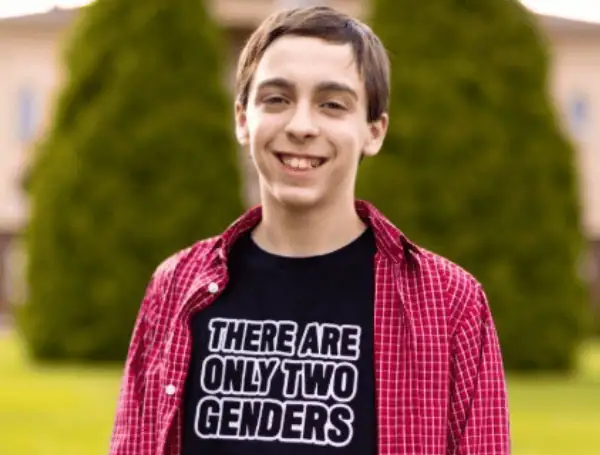
Justice Samuel Alito sharply criticized his Supreme Court colleagues for declining to take up the case of a Massachusetts middle school student who was punished for wearing a T-shirt stating “There Are Only Two Genders.”
In a pointed dissent to the court’s denial of certiorari in Morrison v. Town of Middleborough, Alito argued the decision allows “confusion” over First Amendment rights for students to “linger” and represents a missed opportunity to reinforce protections for “controversial, offensive, or disfavored views.”
The case centers on Liam Morrison, a 7th-grade student at Nichols Middle School (NMS) at the time, who wore the T-shirt to class. School officials sent him home. Days later, after protests and counter-protests occurred off school grounds, Morrison returned wearing the same T-shirt, this time with “CENSORED” taped over the words “Only Two.” He was again disciplined by administrators.
READ: Florida Judge Again Rebuffs Would-Be Trump Assassin, Denies Motion To Suppress Witness ID
Morrison’s subsequent lawsuit, alleging a violation of his First Amendment rights, was unsuccessful at both the federal district court and the 1st U.S. Circuit Court of Appeals. The Supreme Court’s refusal to hear the appeal leaves the 1st Circuit’s ruling in favor of the school district in place.
Justice Alito, joined in his dissent by Justice Clarence Thomas, contended that the core issue revolved around the application of the landmark 1969 Supreme Court case Tinker v. Des Moines. Tinker famously established that students do not “shed their constitutional rights to freedom of speech or expression at the schoolhouse gate,” but allowed schools to restrict speech that “materially and substantially interferes” with the educational environment.
Alito argued that the school and the lower courts had overstepped the bounds set by Tinker. “The First Circuit held that the school did not violate L.M.’s free-speech rights,” Alito wrote. “It held that the general prohibition against viewpoint-based censorship does not apply to public schools. And it employed a vague, permissive, and jargon-laden rule that departed from the standard this Court adopted in Tinker v. Des Moines.”
READ: NRA Asks Supreme Court To Strike Down Florida Under-21 Gun Purchase Ban
According to Alito, Morrison was attempting to “register his dissent and start a dialogue on the topic” of gender identity, a subject on which Alito claims the school itself promotes a specific viewpoint. “NMS promotes the view that gender is a fluid construct and that a person’s self-defined identity — not biological sex — determines whether that person is male, female, or something else,” Alito stated. He highlighted an instance where the school reportedly shared an image on social media of a student wearing a T-shirt that read: “HE SHE THEY IT’S ALL OKAY.”
The school district superintendent had countered that Morrison’s T-shirt violated the dress code by “target[ing] students of a protected class; namely in the area of gender identity.”
Alito saw this as clear viewpoint discrimination. “These freedom-of-speech harms become ‘all the more blatant’ when the government ‘targets not subject matter, but particular views taken by speakers on a subject,’” he wrote, emphasizing that there is no “carveout from this principle for controversial, offensive, or disfavored views.”
The district court had ruled against Morrison, finding his speech infringed on “the rights of others.” The 1st Circuit affirmed, reasoning that his T-shirt could cause a material disruption because it “demean[ed] characteristics of personal identity… that other students at the school share,” and could have a “serious negative psychological impact.”
READ: Liberty Justice Center Urges Supreme Court To Overturn Oregon Recording Ban, Project Veritas Case
Alito rejected this interpretation as “a novel and permissive test that distorts the ‘material disruption’ rule beyond recognition.” He likened Morrison’s T-shirt to the black armbands worn by students protesting the Vietnam War in Tinker, arguing that both were “silent, passive expression[s] of opinion.” He noted that in Tinker, “some of L.M.’s classmates found his speech upsetting. Feeling upset, however, is an unavoidable part of living in our ‘often disputatious’ society, and Tinker made abundantly clear that the ‘mere desire to avoid the discomfort and unpleasantness that always accompany an unpopular viewpoint’ is no reason to thwart a student’s speech.”
Alito also dismissed the school’s concern that Morrison’s T-shirt might lead to a “standoff,” pointing out that Tinker had rejected evidence of “hostile remarks” and classroom disruption as insufficient to justify censorship. “Tinker’s ‘material disruption’ standard is demanding by design,” Alito asserted. “That is because free speech is the rule, not the exception. The First Circuit’s test flips that principle on its head.”
Addressing the argument that the middle school setting (students aged 10-14) might grant administrators more leeway, Alito noted that Mary Beth Tinker herself was a 13-year-old. He further argued, “If a school sees fit to instruct students of a certain age on a social issue like LGBTQ+ rights or gender identity, then the school must tolerate dissenting student speech on those issues… If anything, viewpoint discrimination in the lower grades is more objectionable because young children are more impressionable and thus more susceptible to indoctrination.”
READ: Texas Sen. Ted Cruz: Supreme Court Showdown Looms Over Trump’s Birthright Ban
Justice Thomas, while concurring with Alito’s dissent regarding the misapplication of Tinker in this instance, reiterated his broader view that Tinker itself was wrongly decided, favoring the in loco parentis doctrine for student speech in K-12 schools. Nevertheless, Thomas agreed that Morrison’s T-shirt “plainly did not create a ‘materia[l] disrupt[ion].'”
The Supreme Court’s decision not to intervene means the 1st Circuit’s ruling stands, leaving the legal landscape for student speech in that jurisdiction unchanged and, according to Justice Alito, perpetuating uncertainty on a national level. Sources
Please make a small donation to the Tampa Free Press to help sustain independent journalism. Your contribution enables us to continue delivering high-quality, local, and national news coverage.
Connect with us: Follow the Tampa Free Press on Facebook and Twitter for breaking news and updates.
Sign up: Subscribe to our free newsletter for a curated selection of top stories delivered straight to your inbox.